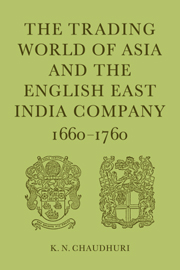Book contents
- Frontmatter
- Contents
- Tables
- Figures
- Maps
- Abbreviations
- Notes on dates, contemporaneous spellings, currency, and weights
- Preface
- Acknowledgements
- 1 The international economy and the East India trade
- 2 A formal theoretical model of the East India Company's trade
- 3 The structure of early trade and the pattern of commercial settlements in Asia
- 4 The evolution of the Company's trading system: operation and policy 1660–1760
- 5 Long-term trends and fluctuations 1660–1760
- 6 Politics of trade
- 7 Markets, merchants, and the Company
- 8 The export of treasure and the monetary system
- 9 The structure of country trade in Asia
- 10 Export of European commodities
- 11 The Company and the Indian textile industry
- 12 The Company's trade in textiles
- 13 Pepper
- 14 Import of bulk goods
- 15 Raw silk
- 16 Coffee
- 17 Imports from China
- 18 Financial results
- 19 Conclusion
- APPENDICES
- General glossary
- Bibliography
- Short titles cited in the reference notes
- Notes
- Index
- Frontmatter
- Contents
- Tables
- Figures
- Maps
- Abbreviations
- Notes on dates, contemporaneous spellings, currency, and weights
- Preface
- Acknowledgements
- 1 The international economy and the East India trade
- 2 A formal theoretical model of the East India Company's trade
- 3 The structure of early trade and the pattern of commercial settlements in Asia
- 4 The evolution of the Company's trading system: operation and policy 1660–1760
- 5 Long-term trends and fluctuations 1660–1760
- 6 Politics of trade
- 7 Markets, merchants, and the Company
- 8 The export of treasure and the monetary system
- 9 The structure of country trade in Asia
- 10 Export of European commodities
- 11 The Company and the Indian textile industry
- 12 The Company's trade in textiles
- 13 Pepper
- 14 Import of bulk goods
- 15 Raw silk
- 16 Coffee
- 17 Imports from China
- 18 Financial results
- 19 Conclusion
- APPENDICES
- General glossary
- Bibliography
- Short titles cited in the reference notes
- Notes
- Index
Summary
The political considerations of the pepper trade
By the middle of the seventeenth century the supremacy of pepper in Europe's trade with Asia was no longer unchallengeable; but this became evident only in retrospect. Pepper was still the most important single commodity imported by the Dutch East India Company. During the triennial period 1648–50, the invoice value of pepper in the V.O.C.'s total trade with Holland was 50.34 per cent and at the Amsterdam sales in the same years it yielded 32.89 per cent of the total sales revenue. For the English Company comparable figures are not available until 1664 when pepper accounted for 13.2 per cent of the returning cargoes from the Indies. In the 1670s its proportion in the Company's Asian trade were not far short of the Dutch figures, though in absolute terms English imports were generally of lesser magnitude. The greater share of the pepper trade which the English East India Company's powerful competitors in the Netherlands managed to reserve for themselves explains at once the profound fears entertained by the Court of Committees towards Dutch intentions and the enormous commercial appeal of pepper on the minds of contemporary merchants. By the third quarter of the seventeenth century it must have become clear to all those who were concerned with the East India trade that there were other and more valuable Asian commodities which could be brought to a profitable market in Europe. But few of them would have been prepared to concede that the national stake in the European pepper trade should be relinquished in favour of rival foreign countries.
- Type
- Chapter
- Information
- The Trading World of Asia and the English East India Company1660-1760, pp. 313 - 328Publisher: Cambridge University PressPrint publication year: 1978
- 2
- Cited by



